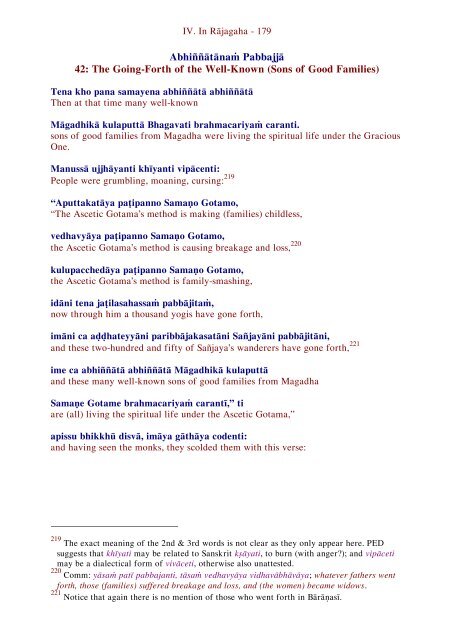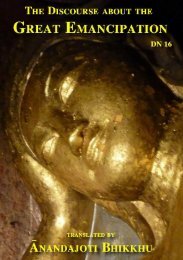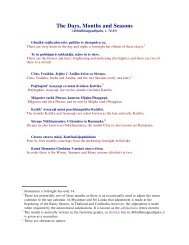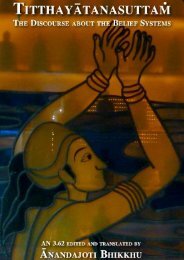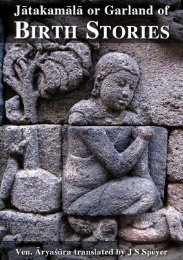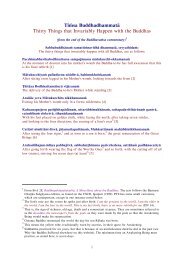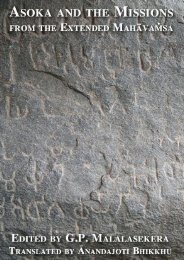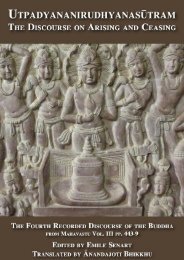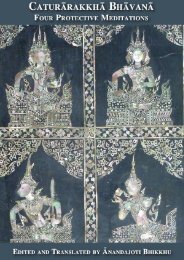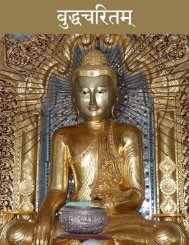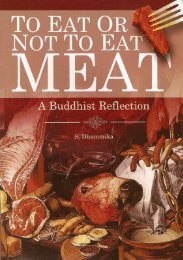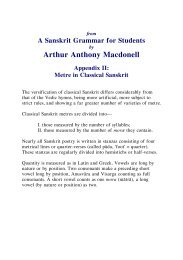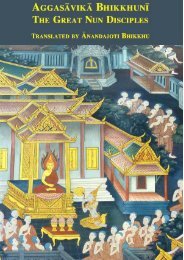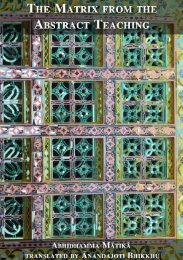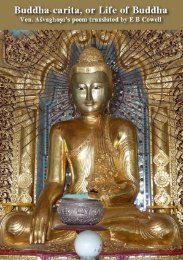MahÄkhandhako The Great Chapter - Ancient Buddhist Texts
MahÄkhandhako The Great Chapter - Ancient Buddhist Texts
MahÄkhandhako The Great Chapter - Ancient Buddhist Texts
Create successful ePaper yourself
Turn your PDF publications into a flip-book with our unique Google optimized e-Paper software.
IV. In Rājagaha - 179<br />
Abhiññātānaṁ Pabbajjā<br />
42: <strong>The</strong> Going-Forth of the Well-Known (Sons of Good Families)<br />
Tena kho pana samayena abhiññātā abhiññātā<br />
<strong>The</strong>n at that time many well-known<br />
Māgadhikā kulaputtā Bhagavati brahmacariyaṁ caranti.<br />
sons of good families from Magadha were living the spiritual life under the Gracious<br />
One.<br />
Manussā ujjhāyanti khīyanti vipācenti:<br />
People were grumbling, moaning, cursing: 219<br />
“Aputtakatāya paṭipanno Samaṇo Gotamo,<br />
“<strong>The</strong> Ascetic Gotama’s method is making (families) childless,<br />
vedhavyāya paṭipanno Samaṇo Gotamo,<br />
the Ascetic Gotama’s method is causing breakage and loss, 220<br />
kulupacchedāya paṭipanno Samaṇo Gotamo,<br />
the Ascetic Gotama’s method is family-smashing,<br />
idāni tena jaṭilasahassaṁ pabbājitaṁ,<br />
now through him a thousand yogis have gone forth,<br />
imāni ca aḍḍhateyyāni paribbājakasatāni Sañjayāni pabbājitāni,<br />
and these two-hundred and fifty of Sañjaya’s wanderers have gone forth, 221<br />
ime ca abhiññātā abhiññātā Māgadhikā kulaputtā<br />
and these many well-known sons of good families from Magadha<br />
Samaṇe Gotame brahmacariyaṁ carantī,” ti<br />
are (all) living the spiritual life under the Ascetic Gotama,”<br />
apissu bhikkhū disvā, imāya gāthāya codenti:<br />
and having seen the monks, they scolded them with this verse:<br />
219 <strong>The</strong> exact meaning of the 2nd & 3rd words is not clear as they only appear here. PED<br />
suggests that khīyati may be related to Sanskrit kṣāyati, to burn (with anger); and vipāceti<br />
may be a dialectical form of vivāceti, otherwise also unattested.<br />
220 Comm: yāsaṁ patī pabbajanti, tāsaṁ vedhavyāya vidhavābhāvāya; whatever fathers went<br />
forth, those (families) suffered breakage and loss, and (the women) became widows.<br />
221 Notice that again there is no mention of those who went forth in Bārāṇasī.


